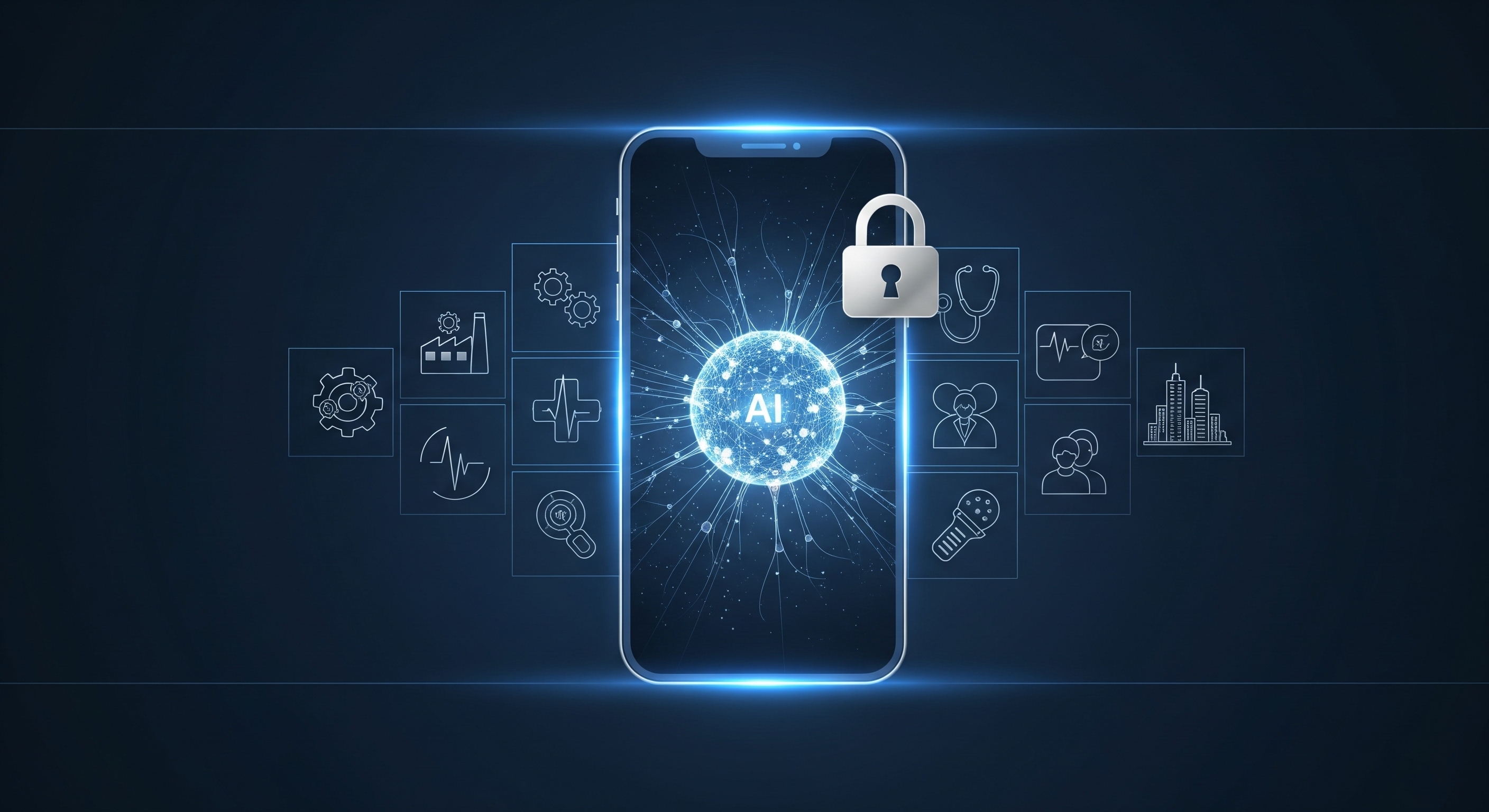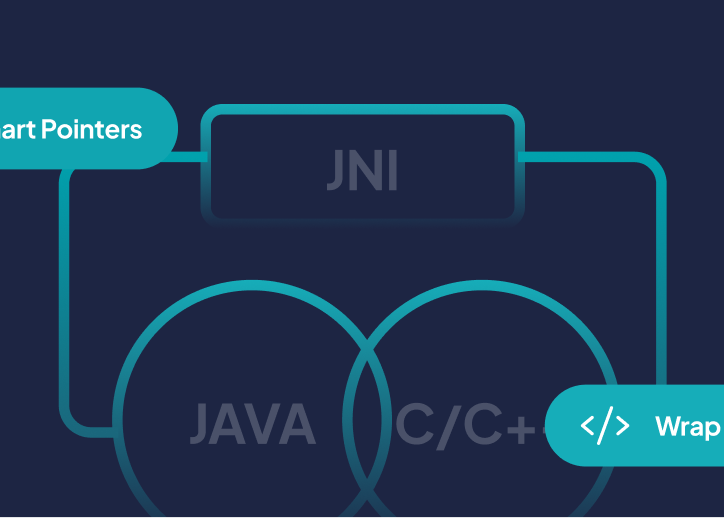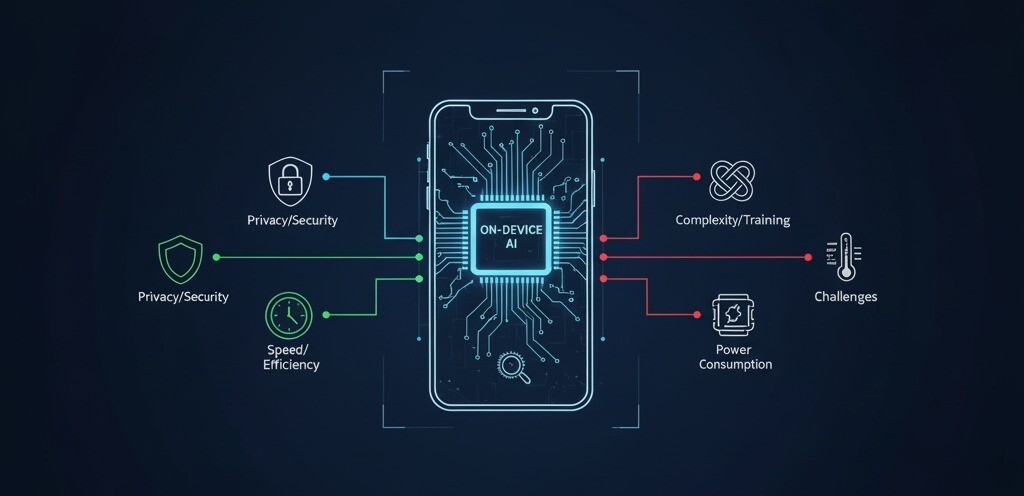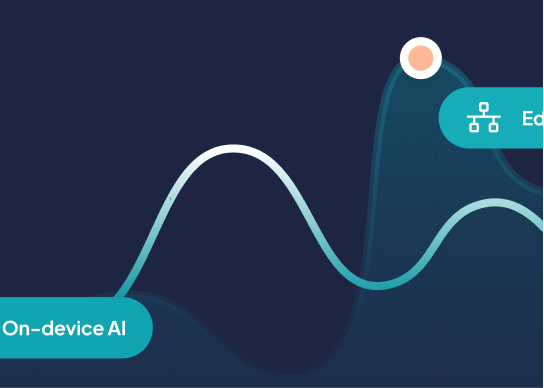Top 5 On-Device AI Use Cases


On-Device AI at the Frontlines: Critical Use Cases Across Industries
The artificial intelligence landscape is rapidly evolving, with enterprise leaders increasingly recognizing that not all AI applications belong in the cloud. While cloud-based AI solutions offer scalability and computational power, certain use cases demand the speed, privacy and reliability that only on-device AI processing can deliver.
On-device AI processes data directly on local hardware rather than sending information to remote servers. This approach eliminates latency, reduces bandwidth costs, ensures data privacy and maintains functionality even without internet connectivity. For businesses operating in regulated industries or handling sensitive information, on-device AI isn’t just preferable but becomes essential.
Modern enterprises across all sectors are discovering that on-device AI is crucial for sensitive business operations that require both privacy and immediate processing capabilities. Enterprise applications handling confidential business data, proprietary information, and sensitive workflows demand local AI processing to maintain competitive advantage and regulatory compliance.
Employee and customer onboarding processes benefit significantly from on-device AI that can analyze documents, verify identities, and process applications without exposing personal information to external servers. HR systems can use local AI to screen resumes, conduct sentiment analysis on employee feedback, and manage performance evaluations while maintaining complete confidentiality.
Invoice management and accounts payable systems leverage on-device AI for automated data extraction, vendor verification, and expense categorization. These applications process financial documents locally, ensuring that sensitive business relationships, pricing information, and payment details never leave the corporate network.
Compliance monitoring represents another critical enterprise use case where on-device AI processes regulatory documents, monitors business communications, and flags potential violations in real-time. This approach ensures that sensitive compliance data and potential issues remain within the organization’s control while enabling immediate corrective action.
Cross-application data integration and business intelligence systems use on-device AI to analyze patterns across multiple enterprise systems, providing insights into operations, customer behavior, and market trends without exposing proprietary business data to third-party cloud services. This capability is particularly valuable for organizations in competitive industries where business intelligence provides strategic advantages.
The healthcare sector represents one of the most compelling use cases for on-device AI implementation. Medical applications require real-time decision-making capabilities while maintaining strict patient data privacy compliance under regulations like HIPAA and GDPR.
Consider diagnostic imaging applications that analyze X-rays, MRIs or CT scans. Cloud-based processing introduces unacceptable delays when healthcare professionals need immediate results for critical patient care decisions. On-device AI enables instant analysis while ensuring sensitive medical data never leaves the hospital network.
Wearable medical devices and remote patient monitoring systems also benefit significantly from on-device AI processing. These devices can continuously analyze vital signs, detect anomalies and trigger alerts without transmitting personal health information to external servers. This approach not only protects patient privacy but also reduces the risk of data breaches that could expose millions of medical records.
Medical device manufacturers are increasingly integrating on-device AI into everything from insulin pumps that automatically adjust dosing based on glucose readings to cardiac monitors that detect irregular heart rhythms in real-time.
The financial services and legal industries face unique challenges that make on-device AI processing essential for maintaining security and regulatory compliance. Banks, law firms, and financial institutions handle enormous volumes of sensitive transaction data and confidential legal documents that require immediate analysis while maintaining strict privacy standards.
Traditional cloud-based fraud detection systems introduce latency that can allow fraudulent transactions to complete before analysis finishes. On-device AI enables real-time transaction monitoring, instantly flagging suspicious activities and blocking potentially fraudulent charges before they process.
Legal services organizations leverage on-device AI for contract analysis, document review, and compliance monitoring. Law firms handling sensitive client information, mergers and acquisitions, or litigation documents require AI processing that ensures attorney-client privilege and confidentiality are never compromised by external data transmission.
Additionally, both financial institutions and legal services must comply with strict data localization requirements in many jurisdictions. On-device AI ensures that sensitive financial data and privileged legal documents remain within controlled environments, helping organizations maintain compliance with regulations like PCI DSS, SOX, GDPR, and regional banking and legal professional standards.
Mobile banking applications and legal practice management systems increasingly rely on on-device AI for biometric authentication, behavioral analysis, and personalized insights. These features enhance user experience while keeping sensitive information secure on the user’s device rather than transmitting it to cloud servers.
The autonomous vehicle industry represents perhaps the most demanding use case for on-device AI processing. Self-driving cars must process enormous amounts of sensor data from cameras, lidar, radar and GPS systems while making split-second decisions that directly impact passenger safety.
Cloud-based processing introduces unacceptable latency for autonomous vehicle applications. A few milliseconds delay in processing visual data or responding to obstacles can mean the difference between safe navigation and accidents. On-device AI enables instantaneous decision-making that keeps passengers safe while navigating complex traffic scenarios.
Fleet management applications also leverage edge AI for real-time route optimization, driver behavior monitoring, and vehicle maintenance predictions. These systems process location data, driving patterns, and vehicle performance metrics locally, providing immediate insights while protecting sensitive transportation data.
Commercial transportation companies use on-device AI for cargo monitoring, fuel efficiency optimization and compliance reporting. These applications require continuous operation regardless of cellular coverage, making local processing essential for maintaining operational efficiency.
Modern retail environments increasingly rely on AI-powered applications that require real-time processing capabilities. From inventory management to personalized customer experiences, on-device AI enables retailers to respond instantly to changing conditions without dependence on cloud connectivity.
Smart retail applications use computer vision and machine learning to analyze customer behavior, optimize store layouts and manage inventory levels. These systems process video feeds and sensor data locally, providing immediate insights while protecting customer privacy by avoiding the transmission of personal information to external servers.
Point-of-sale systems increasingly integrate on-device AI for fraud detection, inventory tracking and personalized promotions. Local processing ensures that transactions complete quickly while maintaining security and reducing the risk of payment data breaches.
Digital signage and interactive kiosks benefit from on-device AI processing that enables personalized content delivery based on customer demographics and preferences, all while processing this information locally to maintain privacy compliance.
On-device AI represents a fundamental shift in how enterprises approach artificial intelligence implementation. For industries handling sensitive data, operating in regulated environments or requiring real-time decision-making capabilities, local AI processing isn’t just advantageous, it’s becoming absolutely necessary.
Organizations considering AI implementation should carefully evaluate their specific requirements for latency, privacy, compliance and connectivity. In many cases, the benefits of on-device AI provide enterprises with the performance, security and reliability they need to succeed in today’s competitive landscape.
Explore our DeliteAI platform on Github: https://github.com/NimbleEdge/deliteAI to learn how NimbleEdge is enabling these use cases and building intelligent experiences without sacrificing privacy or performance.

Ever felt Ever felt like JNI was more of a puzzle box than a useful tool? Fear not—today we’re diving deep into JNI without the headaches! 🚀

On-Device AI: Why It’s Both the Biggest Challenge and the Ultimate Solution for the Future of Computing

The introduction of Large Language Models (LLMs) and Generative AI (GenAI) has been a major milestone in the field of AI. With AI models encapsulating vast amounts of world knowledge, their ability to reason and understand human language has unlocked unprecedented possibilities